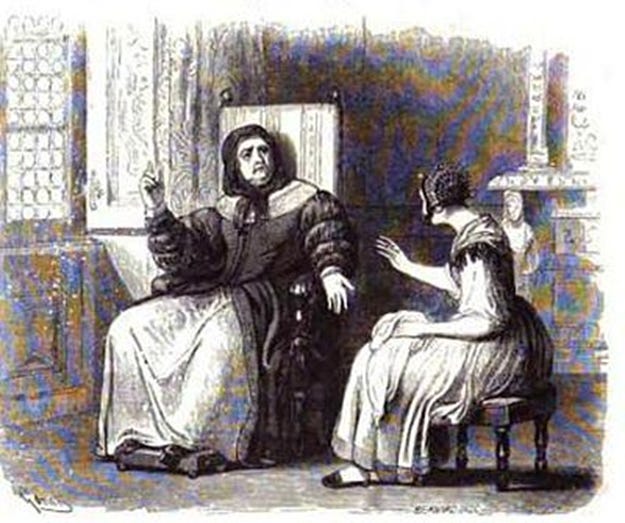APS TOGETHER
Day 32
The Betrothed by Alessandro ManzoniChapter 25
March 24, 2023 by Michael F. Moore
We’re back to Pescarenico, where the villagers now feel free to gossip about Don Rodrigo. Or do they. First a general consideration:
“When people cannot give vent to indignation without grave danger, they not only express it less (if at all), they actually feel it less. But who could resist asking and conversing about such a sensational event, in which the hand of God had been witnessed, and two such remarkable characters had made such a remarkable impression?”
And yet:
“Now his many other feats were criticized, and in their regard, encouraged by the general consensus, people said what they felt. But in a whisper, with a shudder, and from a distance, since he was still surrounded by bravi.”
Two new characters are introduced, an odd couple if there ever was one!
Donna Prassede,
“An elderly noblewoman with a strong propensity for good deeds, certainly the worthiest profession a person can exercise, but which can unfortunately—like all the others—also make matters worse.”

Here she is in the 1989 television adaptation.
And her husband, the pedant, Don Ferrante, with his perfect orthography. “Ortografia” is a word that gave me pause. Nowadays, when Italians talk about spelling, they call it “lo spelling.” Ortografia, like orthography, refers to “the art of writing words with the proper letters according to standard usage” (Merriam-Webster online dictionary). I could have simply said, “calligraphy” or “spelling,” but I felt that orthography was more suitable for a pedant. But more on Don Ferrante in Chapter 27.
Don Abbondio finally gets the dressing down he’s been fearing.
“‘Reverend Father.’ These words were uttered in a manner that left no doubt that they were the start of a long and serious conversation… ‘They must have spilled the beans this morning,’ Don Abbondio said to himself.”
In Italian, “Hanno votato il sacco stamattina coloro" - They emptied the bag this morning. As you can see, idiomatic expressions don’t always work in a literal translation. Luckily, English has plenty of idioms of its own. But two others in this chapter carry over pretty well:
“Did [the Church] not warn you that you were being sent forth as a lamb among wolves?”
And a few sentences later,
“In the middle of these arguments, [Don Abbondio’s] spirit was like a chick between the talons of a hawk.”
Remember the clay pot among iron kettles? He admits it openly:
“It’s hard to be brave when you’re not.”
